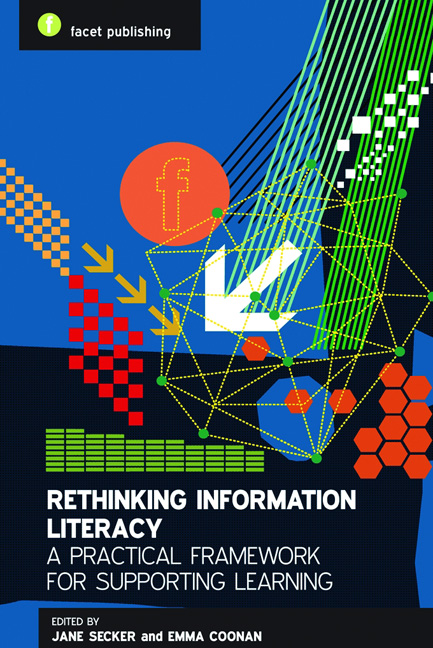Book contents
- Frontmatter
- Contents
- Acknowledgements
- Contributor profiles
- Introduction
- Strand One Transition from school to higher education
- Strand Two Becoming an independent learner
- Strand Three Developing academic literacies
- Strand Four Mapping and evaluating the information landscape
- Strand Five Resource discovery in your discipline
- Strand Six Managing information
- Strand Seven The ethical dimension of information
- Strand Eight Presenting and communicating knowledge
- Strand Nine Synthesizing information and creating new knowledge
- Strand Ten The social dimension of information
- Afterword: ‘Ownership is a flawed concept’
- Conclusion
- Appendix 1 A New Curriculum for Information Literacy (ANCIL): the curriculum
- Appendix 2 ANCIL Lesson Plan
- Appendix 3 ANCIL Institutional Audit: worksheet
- Appendix 4 ANCIL Institutional Audit: interview questions
- Index
- Miscellaneous Endmatter
- Miscellaneous Endmatter
- Miscellaneous Endmatter
- Miscellaneous Endmatter
Introduction
Published online by Cambridge University Press: 08 June 2018
- Frontmatter
- Contents
- Acknowledgements
- Contributor profiles
- Introduction
- Strand One Transition from school to higher education
- Strand Two Becoming an independent learner
- Strand Three Developing academic literacies
- Strand Four Mapping and evaluating the information landscape
- Strand Five Resource discovery in your discipline
- Strand Six Managing information
- Strand Seven The ethical dimension of information
- Strand Eight Presenting and communicating knowledge
- Strand Nine Synthesizing information and creating new knowledge
- Strand Ten The social dimension of information
- Afterword: ‘Ownership is a flawed concept’
- Conclusion
- Appendix 1 A New Curriculum for Information Literacy (ANCIL): the curriculum
- Appendix 2 ANCIL Lesson Plan
- Appendix 3 ANCIL Institutional Audit: worksheet
- Appendix 4 ANCIL Institutional Audit: interview questions
- Index
- Miscellaneous Endmatter
- Miscellaneous Endmatter
- Miscellaneous Endmatter
- Miscellaneous Endmatter
Summary
We live in the age of information, where the physical, economic and social barriers that previously stemmed the flow of knowledge have been largely broken down by the internet and related technologies. This is the digital age, where computers and technologies are supremely powerful and the potential that they offer to human endeavour and particularly to education is great. However, in this world of digital information it is more critical than ever before to ensure that citizens of the world are information literate. People need the skills and values to enable them not just to access information but to use it to make informed judgements and choices, to make their voices heard and make a difference. Librarians have recognized this for many years and call these skills and values ‘information literacy’.
Information-literate people are discerning in their choice of information sources and their use of knowledge. They are judicious citizens who can use information to transform their circumstances, create new knowledge and reach their full potential. There is a growing recognition that simply providing access to information through digital technology is not enough. There is a need to develop individuals with the ability to ask questions of the information they find and to evaluate sources critically. These abilities are recognized by UNESCO as human rights, fundamental to democracy (UNESCO, 2005) and they should be a goal for educators everywhere.
Information literacy is particularly crucial for young people as they progress through school, further and higher education and into the place of work, but we also must ensure that everyone, whether retired or working, young or old, rich or poor, is equipped with these vital abilities. Educators are preparing children and young people for a world in which change is inevitable. Computing power has developed at such a speed that tasks that previously required large computers filling a room can now be undertaken using a device that fits in our pockets. It is a seemingly impossible task for teachers to prepare the child born in 2012 for careers and professions that they cannot imagine. Yet if the pace of technological development over the past 25 years continues, our need for an increasingly skilled and digitally literate population will only become more critical.
- Type
- Chapter
- Information
- Rethinking Information LiteracyA practical framework for supporting learning, pp. xv - xxxPublisher: FacetPrint publication year: 2012



